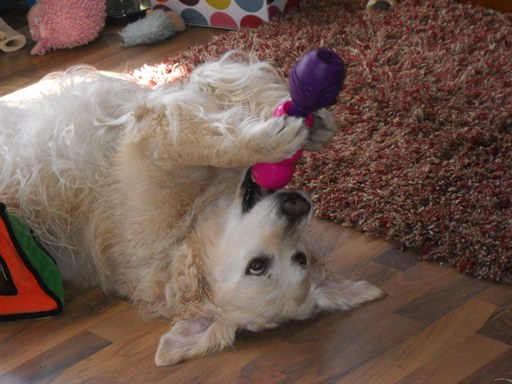Barks Blog
Career Aptitude Testing … for Dogs

What if there were a test that could tell you whether a dog would make a good assistance dog or detection dog or search & rescue dog … or whatever career you hoped the dog would choose?
Researchers Evan MacLean and Brian Hare are working on it. Their recently published study, “Enhanced Selection of Assistance and Explosive Detection Dogs Using Cognitive Measures,” describes initial attempts to create a sort of career aptitude test for working dogs.
What I love about this study:
- It recognizes that dogs’ cognitive abilities a) exist, b) matter, and c) have bearing on their suitability for certain tasks and careers. The authors point out that most testing of working dog candidates looks at temperament and behavior. That is, dogs with high prey drive might be dropped from service dog training or dogs that bark a lot or show reactivity to other dogs might be dropped from assistance and other working-dog-training programs. This is the first attempt to identify cognitive abilities that also impact the dogs’ suitability for various careers.
- The authors recognize a broad variety of cognitive areas and abilities; they also recognize that different working-dog specialties require different cognitive strengths. Anyone willing to recognize and study dogs as cognitive beings who are as individual in their strengths, weaknesses, and preferences is a hero to me.
- The emphasis is on problem-solving and whether a dog seeks help when stymied; these are useful doggy traits and reveal much about the dog’s intelligence as well as her temperament and behavior!
- The study was completely voluntary for all doggy participants and they could leave at any time. They worked for food or toy rewards. (Oddly, preference for toy or food reward was one of the cognitive “measures” evaluated; I’m not clear on what that reveals cognitively.)
- The authors emphasize that certain results might predict greater success in an area of training. They’re not seeking or claiming to offer a definitive correlation but rather pointing trainers toward what to look for in candidate dogs. This might focus trainers on each dog’s individual behaviors and preferences, which is likely to bode well for the dog-trainer relationship and perhaps for the dog’s success in training.
- The tests themselves are simple, do not require specialized equipment, and are easy for a trainer to learn and administer.
More research is needed:
- The dogs tested were not puppies: The assistance dog trainees were all around two years of age. The detection dogs tested ranged from about three to five years. To be useful as a predictor, it would be wonderful to have a few tests that could be done with puppies or maybe adolescent dogs (six months?). That would help trainers of limited means select the puppies with the highest likelihood of success and allow earlier release of less-suitable dogs.
- Additional testing, and testing across a broader range of working-dog careers, could provide a more targeted set of traits or tests for specific careers. Again, kudos to the authors for recognizing that, for example, hearing dogs require different temperaments and different skill sets than mobility assistance dogs. I’d love to see a targeted test for each of the common types of assistance, detection, search, etc. dogs.
- A challenge the authors faced was the lack of a clear-cut definition of “success.” This is a tough one. Even within, say, mobility assistance dog training, there’s probably considerable disagreement over which dogs are “successful.” Even so, a short battery of cognitive tests could be helpful.
Overall, I think this study is a wonderful addition to the body of dog-focused study, and I am over-the-moon delighted to see canine cognition testing taken seriously. The study is available free. At the end of the study, there’s a link to download the supplemental materials, which consist of a description of each cognitive test performed. That means we can all take it and start learning about our own dogs. Have fun!
